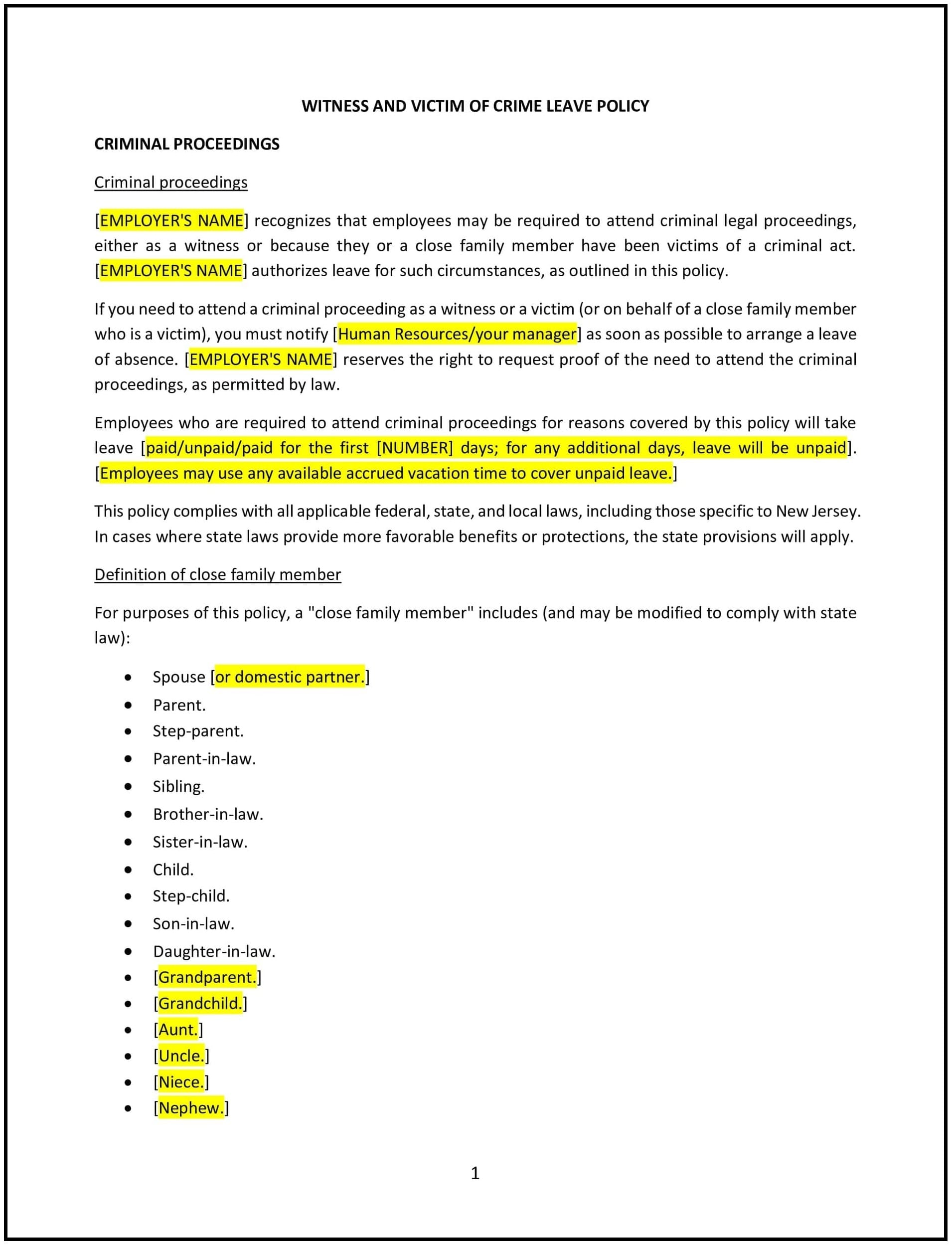Witness and victim of crime leave policy (New Jersey): Free template
Got contracts to review? While you're here for policies, let Cobrief make contract review effortless—start your free review now.

Customize this template for free
Witness and victim of crime leave policy (New Jersey)
A witness and victim of crime leave policy helps New Jersey businesses establish clear guidelines for providing employees with leave to attend court hearings or support legal proceedings when they are victims or witnesses of a crime. This policy outlines the eligibility criteria, the process for requesting leave, and how the company will support employees during these situations.
By adopting this policy, businesses in New Jersey can assist employees in fulfilling their legal obligations while maintaining a supportive and legally compliant work environment.
How to use this witness and victim of crime leave policy (New Jersey)
- Define eligibility for leave: Specify which situations qualify for leave, including employees who are victims of a crime or who need to testify as a witness in criminal court.
- Set the process for requesting leave: Outline the procedure for requesting leave, including how much notice is required and the type of documentation employees need to provide (e.g., court summons, police report).
- Clarify the duration of leave: Define how much leave employees are entitled to for attending court or supporting a legal case, whether it is paid or unpaid, and if there are any limitations on the amount of leave granted.
- Address job protection: Ensure that employees who take leave under this policy are not subject to retaliation and that their job is protected during their absence.
- Explain compensation for leave: Specify whether the leave will be paid, partially paid, or unpaid, and provide guidelines for how compensation is determined if the leave is paid.
- Address the impact of leave on benefits: Clarify how taking leave under this policy affects employee benefits, such as health insurance or paid time off (PTO).
- Review and update: Regularly assess the policy to ensure it aligns with New Jersey regulations and company practices for managing employee leave.
Benefits of using this witness and victim of crime leave policy (New Jersey)
This policy provides several benefits for New Jersey businesses:
- Supports employees during difficult times: Provides employees with the time they need to attend court hearings or handle legal matters related to being a victim or witness of a crime.
- Promotes fairness: Ensures that employees are not penalized for fulfilling their civic duties or handling legal obligations as victims or witnesses.
- Reduces the risk of legal challenges: Helps businesses comply with New Jersey laws related to witness and victim leave, reducing the risk of lawsuits or legal disputes.
- Enhances employee morale: Demonstrates the company’s commitment to supporting employees in challenging circumstances, improving job satisfaction and loyalty.
- Maintains business continuity: Clearly outlines how employees can request leave and what compensation they can expect, allowing the company to plan for absences and ensure smooth operations.
Tips for using this witness and victim of crime leave policy (New Jersey)
- Communicate the policy clearly: Ensure that all employees are aware of their rights under the policy and understand how to request leave when they are victims or witnesses of a crime.
- Request timely documentation: Require employees to provide documentation, such as court subpoenas or police reports, to support their request for leave.
- Offer flexibility: Be flexible with employees who may need to adjust their leave due to unexpected court schedules or delays.
- Monitor leave usage: Track the amount of leave taken by employees under this policy to ensure that the company’s staffing needs are met and that employees do not exceed the allotted leave.
- Review the policy regularly: Update the policy as needed to align with New Jersey regulations, business operations, or employee needs.